Local Douglas County Wineries Pave Their Own Path
| 2016 Q4 | story by Liz Weslander | photos by Steven Hertzog
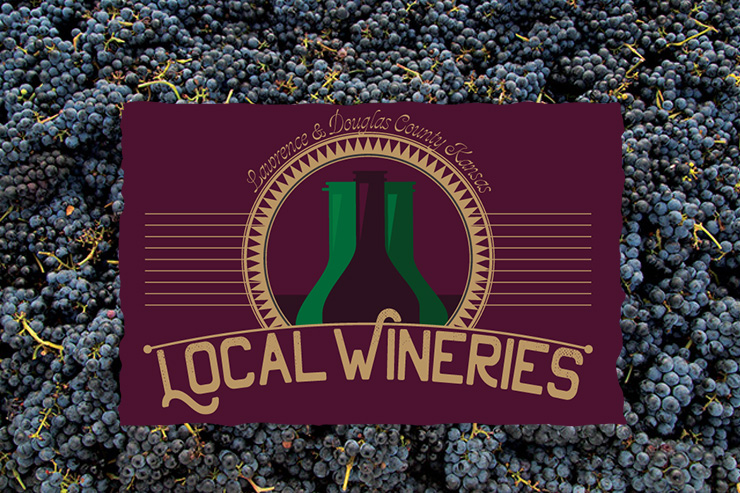
Blue Jacket Grapes
It may not be exactly what you find in Napa Valley, but Kansas wineries can hold their own when it comes to making good wine.
Let’s get this out of the way: You’re probably never going to find a Kansas wine that tastes like your favorite California wine. But that’s not because Kansas wines are inherently inferior. It’s because the grapes that grow well in California are not the same grapes that grow well in Kansas. Different grapes equal different wines.
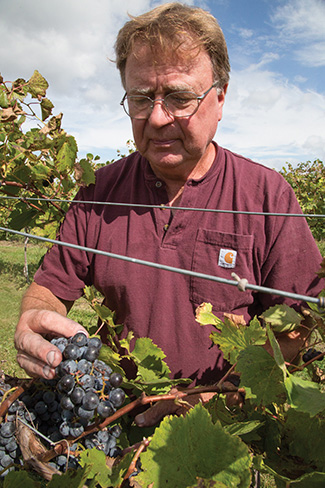
Pep Solberg, owner of BlueJacket Crossing Winery and Vineyard
Pep Solberg, owner of BlueJacket Crossing Winery and Vineyard, in Eudora, admits even he came to this realization reluctantly. Prior to moving back to Kansas in 2001 to start BlueJacket on land adjacent to his parents’ farmland, Solberg worked as a builder in California’s Bay Area for several years. When he visited Kansas from California, Solberg says he always refused to visit Davenport Orchard, Vineyard and Winery, in Eudora, where owner Greg Shipe has been selling wine made with Kansas fruit since 1996.
“I was convinced that the only place to get a decent wine was California,” Solberg says. “But I finally went down to Davenport in 2000, and I’ll be damned if I didn’t go in there, ask to try some dry red and find it was really good. I ended up taking a bunch of it back to friends on the West Coast.”
Davenport and BlueJacket—two of five licensed farm wineries in Douglas County—are part of Kansas’s relatively new, but quickly growing, wine industry. Although Kansas was a significant grape-growing state prior to prohibition, commercial wine production did not become legal in Kansas again until 1985. According to the Kansas Department Revenue, there are currently 41 active farm winery licenses in the state. Despite the challenges and hard work involved in growing grapes in an area with unpredictable weather extremes, entrepreneurs like Shipe and Solberg are committed to building a positive reputation for Kansas wines, with a focus on the unique grapes that thrive here.
The Davenport wine that changed Solberg’s mind about Kansas wine was made with Norton grapes. Developed by Dr. Daniel Norton in 1827 in Virginia, Norton grapes, which also commonly go by the name Cynthiana, are popular in Mid-Western vineyards because they fare well in varying weather extremes. Shipe grows 17 varieties of grapes at Davenport but has more Norton vines (about 3000) than anything else.
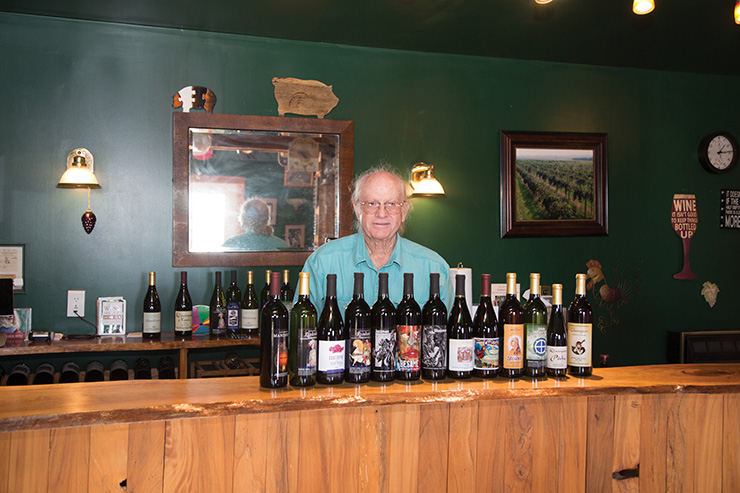
Greg Shipe, owner Davenport Orchard, Vineyard and Winery, in Eudora
While wines made with Norton grapes are a good option for experienced drinkers who like dry reds, Shipe says many people who come to the Davenport tasting room prefer sweeter wines. Their best-selling wine is a sweet red made with Fredonia grapes, called Charlotte’s Red.
“We get people in here who have just turned 21 or older people who were never wine drinkers,” Shipe says. “When people first start drinking wine, they will usually start with a sweet, fruity wine. There are a lot of new wine drinkers in Kansas who weren’t drinking wine until we opened.”
When Solberg planted his first grapes for BlueJacket in 2001, he started small, with 1 acre of Norton grapes. During the course of the next seven years, he slowly expanded the vineyard, built a tasting room and learned as much as he could from Shipe and other local winemakers. He opened the BlueJacket tasting room to the public in 2008.
“Because of my lack of knowledge and starting something like this at [the]age of 55, we really had to be careful about learning and being successful, and taking what revenue we generated and putting it back into the business,” Solberg says. “There’s so much to understand, between the grapes themselves and the mechanics of the vineyard, and you just don’t pick that up in a short amount of time.”
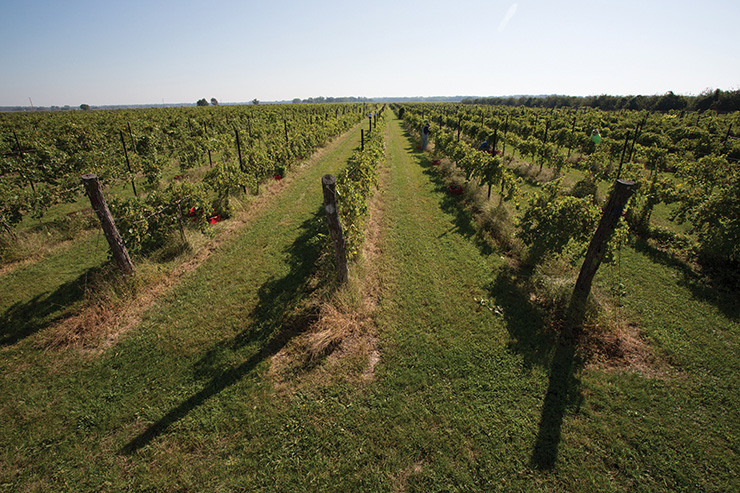
Davenport Orchard, Vineyard and Winery
Another reason Solberg waited to open the BlueJacket tasting room is he wanted to grow enough fruit on-site to meet the minimum “percentage of products grown” set by the State of Kansas for farm wineries. This provision requires that a certain percentage of the fruit used to make Kansas wines actually be grown in Kansas. When BlueJacket opened in 2008, the minimum was 60 percent. However, in 2012, the minimum was reduced to 30 percent as part of House Bill 2689.
While the lower minimum makes it easier for Kansans to open a winery and is a positive incentive for growth in the industry, both Shipe and Solberg have misgivings about the provision.
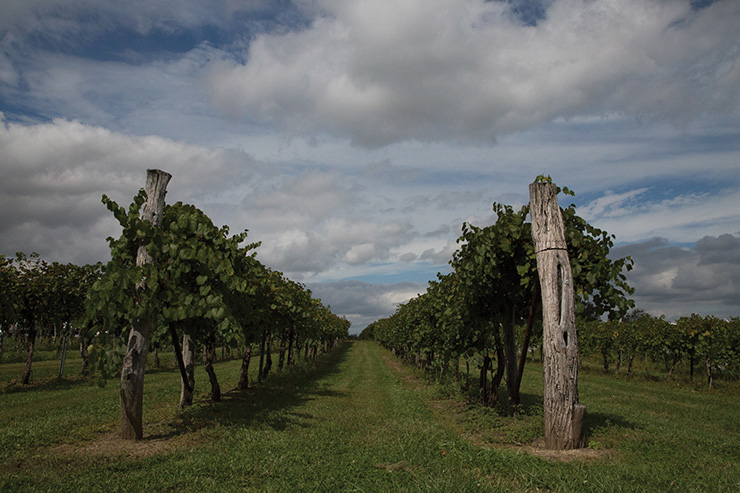
BlueJacket Crossing Winery and Vineyard
“It’s misleading for customers because wineries operate under Kansas Farm Winery License,” Shipe says. “That gives the impression that the grapes used to make the wine were grown in Kansas.”
Davenport wines are made with 100 percent Kansas-grown fruit. BlueJacket wines are also made with primarily domestic fruit, with the occasional supplement from one Missouri vineyard.
“There are a lot of wineries in Kansas that are producing the California-style wine, but it’s not grown here, it’s trucked in from someplace like Lodi, California,” Solberg says. “I understand that the lower minimum is a real positive incentive, but it is still necessary that our state grows more fruit.”
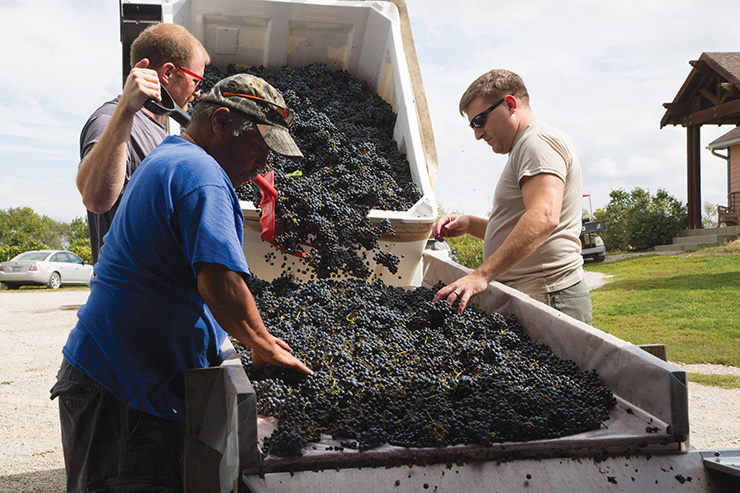
Harvest at BlueJacket Crossing Winery and Vineyard
Rising to the challenge of discovering grapes that will both grow in the Midwest and produce a great wine is what’s fun about operating a Kansas farm winery, Solberg explains. While experimenting with the more than 100 varietals found in the Mid-West, Solberg says he has been especially pleased with some of the French hybrid varietals—French rootstocks that have been altered over time to have shorter growing seasons and to be more resistant to drought and rain.
Two of Solberg’s favorite hybrid varietals are Chambourcin, which he says has an overtone of strawberry to it, and Vignoles, which he describes as having a wonderful citrus characteristic.
“If you pick the right varietal and do a good job with it, then it’s something unique to our area,” Solberg says. “That’s what makes having a vineyard in Kansas more fun; there’s a little bit of a challenge with the weather, but there’s a reward in having a local product.”
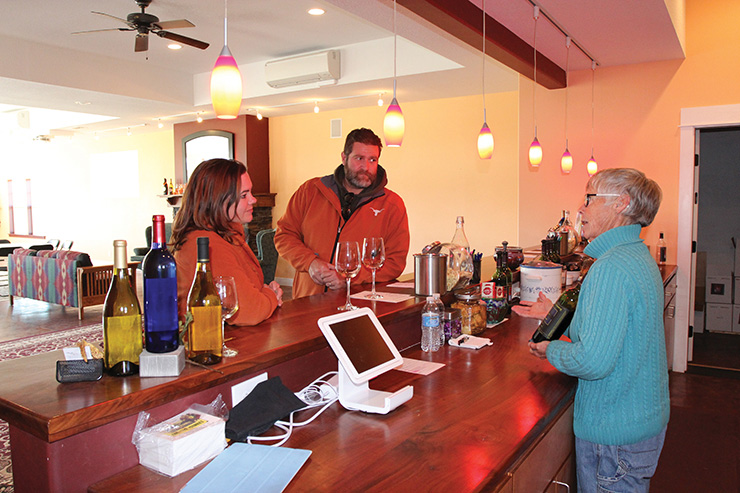
BlueJacket Crossing Winery and Vineyard Tasting Room
Because Kansas farm wineries are allowed to sell their product directly to customers, the majority of Davenport’s and BlueJacket’s sales are by customers who visit their tasting rooms, and Solberg says creating a comfortable and welcoming experience for people who visit the winery is a big part of the business. With that said, creating a quality product customers respond positively to is the heart of the wine business. Unfortunately, there are some wineries in the state that may have lost sight of this, Solberg explains.
“There’s a lot of different aspects to our industry, and a lot times, a winery is not so interested in wine or winemaking, they are more interested in events they can host. That’s not really not a winery,” Solberg says. “People will tell me that they went to a winery and that the music was really good, but they didn’t find a wine they liked, and that kills just all of our reputations.”
Haven Pointe Winery, near Baldwin, which first opened to the public on the first weekend in October for the Kaw Valley Farm Tour, is the newest farm winery in Douglas County. Owner Tom Holland, who describes himself as a total novice, says his half-acre plot of Chambourcin and Tramanet grapes will not be mature enough to use for wine production until 2019. In the meantime, he produces Haven Point’s wine in the basement of his home using Kansas fruit from other farms.
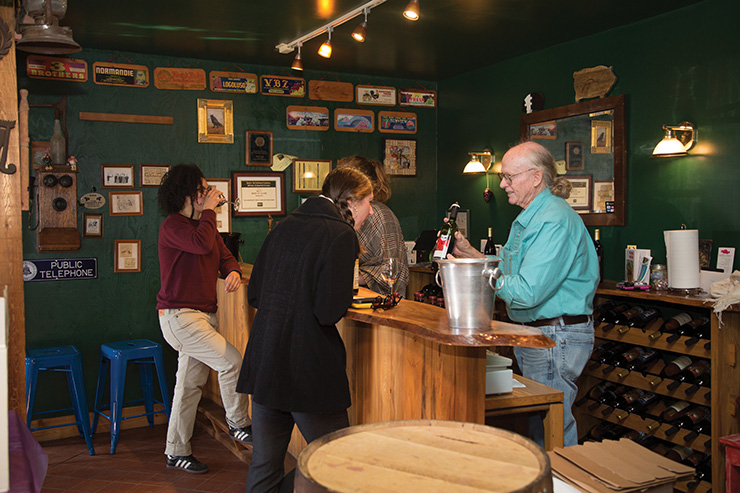
Davenport Orchard, Vineyard and Winery Tasting Room
When it comes to growing grapes and making wine, Holland says one of the pleasant surprises about getting into the local wine business has been that local wineries are supportive of one another and happy to share the knowledge they have learned along the way. He believes this type of camaraderie can only help push the industry forward.
Although a modest pop-up shade currently serves as Haven Pointe’s tasting room, Holland says it’s the interaction with customers at tastings that really makes the experience.
“This is not a business you get into to get rich, because you will not,” he says. “You get into it because you love making a handcrafted product that you can give to the consumer and get feedback. Kansas used to produce a heck of a lot of grapes, but prohibition killed that. The state is now seeing a resurgence in the wine industry, and my commitment is to put quality Kansas wines on people’s table. There’s some great product out there, and I want consumers to be aware of that.”
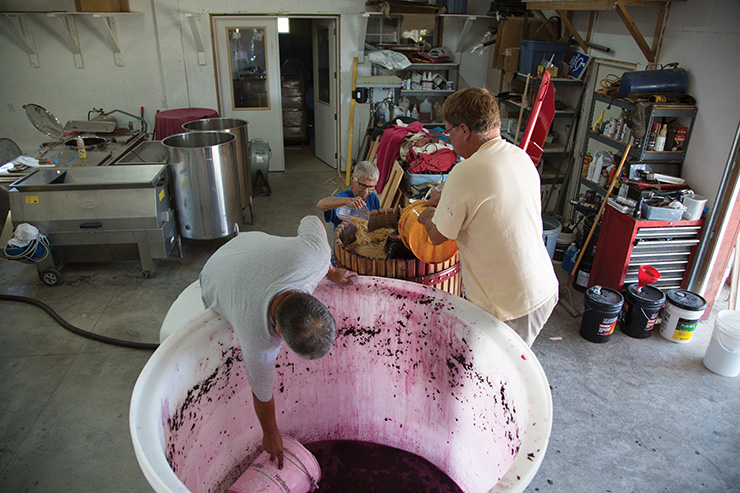
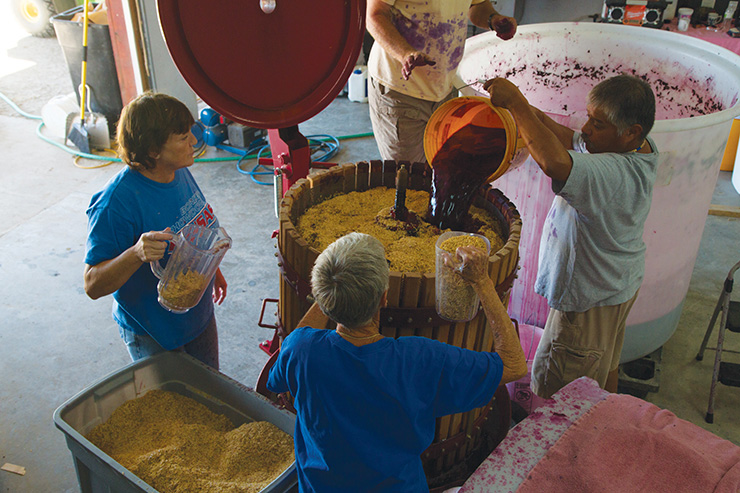 Making wine at BlueJacket Crossing Winery and Vineyard
Making wine at BlueJacket Crossing Winery and Vineyard

1 Comment
http://cytpremium.com/# buy cytotec pills